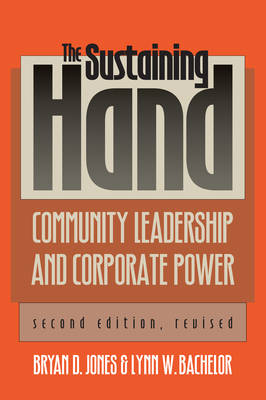
- Retrait gratuit dans votre magasin Club
- 7.000.000 titres dans notre catalogue
- Payer en toute sécurité
- Toujours un magasin près de chez vous
- Retrait gratuit dans votre magasin Club
- 7.000.0000 titres dans notre catalogue
- Payer en toute sécurité
- Toujours un magasin près de chez vous
The Sustaining Hand
Community Leadership and Corporate Power?second Edition, Revised
Bryan D Jones, Lynn W Bachelor
25,45 €
+ 50 points
Description
As the recent shake-up at GM underscores, the new global economy has widened the cracks and stresses in the American auto industry. But, as this new edition of the highly regarded Sustaining Hand reminds us, the auto industry remains a central if volatile player in American urban politics. In this significantly revised update, Bryan Jones and Lynn Bachelor have extended and refined their analysis of Detroit-area automakers and political leaders negotiating the selection of new factory sites (and thus the addition of thousands of jobs to the local economy). Their thorough revision develops a crucial new concept--solution sets--updates all plant location decisions reported in the first edition, and adds an instructive new case study--the Chrysler Jefferson Avenue plant in Detroit. This book seeks to uncover the linkages between business leaders(motivated by profit) and political decision makers (motivated by electoral gain) by examining the responses of public officials in three Michigan "auto cities"--Detroit, Flint, and Pontiac--to plant-location choices made by General Motors and Chrysler. Throughout, the authors focus on three issues-the relationship between the local industrial economy and the local political system, the structure of urban politics, and the degree of independence of political decision makers in urban affairs. As Jones and Bachelor show, urban regimes, in their efforts to shore up sagging economies, develop characteristic solution-sets that are applied almost routinely to superficially similar situations. In fact, they contend, it's rare for a regime to start with a problem and search for a policy solution. Instead, through a pattern of interactions among politicians, business executives, labor unions, and other interested parties, a "package" of problem-definitions and preferred solutions emerges. But if applied indiscriminately, these solutions can become dysfunctional, which in turn may attract new participants to the policy process and ultimately alter the regime's character. "An excellent case analysis of urban political economy. . . interesting, sophisticated, well written. It is sure to be widely discussed."--Clarence N. Stone, author of Urban Policy and Politics in a Bureaucratic Age and Economic Growth and Neighborhood Discontent. "This new version makes significant new contributions to both the urban politics and public policy literatures, and indeed marries them in an utterly unique way. The concept of solution sets is brilliant, and I assume that it will be much discussed and utilized in the urban literature."--Dennis Judd, author of The Politics of American Cities: Private Power and Public Policy. Praise for the first edition: "An excellent book. The authors demonstrate a considerable capacity for theoretical innovation and a rare appreciation of the detail and complexity of local economic development. This book is a model for those who would like to situate the local economic development process in a more general analytical framework."--Urban Studies "A provocative addition to the literature"--Choice
Spécifications
Parties prenantes
- Auteur(s) :
- Editeur:
Contenu
- Nombre de pages :
- 296
- Langue:
- Anglais
- Collection :
Caractéristiques
- EAN:
- 9780700605996
- Date de parution :
- 15-06-93
- Format:
- Livre broché
- Format numérique:
- Trade paperback (VS)
- Dimensions :
- 169 mm x 217 mm
- Poids :
- 453 g

Les avis
Nous publions uniquement les avis qui respectent les conditions requises. Consultez nos conditions pour les avis.






